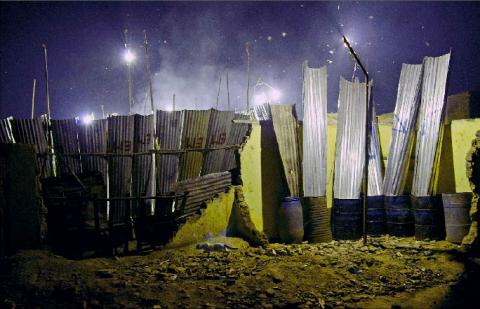Standing in the glare of a 250 watt light bulb in the yard of his uncle’s house, Hilary Turyamugumya peers hopefully into the night sky in search of grasshoppers.
“Every evening I first pray for there to be power — and then I pray that the grasshoppers will come,” Turyamugumya said.
Stripped of their wings and fried with onions, grasshoppers are a delicacy in Uganda’s central region — gobbled up by the handful and washed down with beer in bars around Kampala.

Photo: AFP
This time of year should be peak season for the insect catchers, but Turyamugumya — who uses bright lights to attract the flying insects before disorientating them with smoke and trapping them in disused oil drums — says that business is tough.
“The problem has been power. It is on and off. Like last night, the whole night it was off,” the 33-year-old said.
From bakeries to beauticians to building firms, small businesses across Uganda have been struggling to cope with worsening power cuts in recent months.

Photo: AFP
Growing demand and a government failure to pay its bills saw power to some parts of the country cut for days at a time.
For Turyamugumya, and many others who work catching grasshoppers, no power means no light and no light means no grasshoppers.
Turyamugumya estimates his income this season will be half what it was in the previous grasshopper season.
“There is a shortage of grasshoppers and it is creating a problem for those who are catching and selling them,” Turyamugumya said.
Wandering up and down a strip of bars in the bustling Kabalagala suburb of the capital with his plastic bucket of grasshoppers, vendor Andrew Tumulamye agrees.
Power problems mean that the price he pays for grasshoppers at the market has gone up — and that means insect-loving bar-goers are having to pay more for the snacks. The price for the smallest bag has doubled to about US$0.45.
“When power is not good the prices go up and our customers cannot buy,” said Tumulamye, who is 18.
However, despite the price rises, the lure of a freshly fried grasshopper is too strong to resist for many Ugandans.
“They have a lot of proteins and a special taste like shrimps, they are like seafood. Look at this head, it is what I like most,” said bar owner Asha Cartier, after washing down a crunchy mouthful of insects with a glass of vodka.
As for the broader issue of power, the government admits that years of under-investment in the sector have left the country facing major shortfalls and forced the authorities to rely on expensive diesel generators.
In recent months, rising fuel prices and a weakening local currency have meant the government has struggled to cover bills for diesel generators and left the country facing a shortfall, Ugandan State Minister for Energy Simon D’ujanga said.
However, D’ujanga said, things are improving. Early this year a new hydroelectric power plant is set to come online.
“The future is bright, but for the time being we have to put up with this inconvenience,” D’ujanga said.
Those improvements will take time, however, and with the end of the current grasshopper season approaching fast, Turyamugumya says he cannot wait that long for the power supply to get better.
“We are looking for other ways to make sure we have power,” he said. “Me, I am already thinking of buying a big generator.”

To many, Tatu City on the outskirts of Nairobi looks like a success. The first city entirely built by a private company to be operational in east Africa, with about 25,000 people living and working there, it accounts for about two-thirds of all foreign investment in Kenya. Its low-tax status has attracted more than 100 businesses including Heineken, coffee brand Dormans, and the biggest call-center and cold-chain transport firms in the region. However, to some local politicians, Tatu City has looked more like a target for extortion. A parade of governors have demanded land worth millions of dollars in exchange

An Indonesian animated movie is smashing regional box office records and could be set for wider success as it prepares to open beyond the Southeast Asian archipelago’s silver screens. Jumbo — a film based on the adventures of main character, Don, a large orphaned Indonesian boy facing bullying at school — last month became the highest-grossing Southeast Asian animated film, raking in more than US$8 million. Released at the end of March to coincide with the Eid holidays after the Islamic fasting month of Ramadan, the movie has hit 8 million ticket sales, the third-highest in Indonesian cinema history, Film

Taiwan Semiconductor Manufacturing Co’s (TSMC, 台積電) revenue jumped 48 percent last month, underscoring how electronics firms scrambled to acquire essential components before global tariffs took effect. The main chipmaker for Apple Inc and Nvidia Corp reported monthly sales of NT$349.6 billion (US$11.6 billion). That compares with the average analysts’ estimate for a 38 percent rise in second-quarter revenue. US President Donald Trump’s trade war is prompting economists to retool GDP forecasts worldwide, casting doubt over the outlook for everything from iPhone demand to computing and datacenter construction. However, TSMC — a barometer for global tech spending given its central role in the

Alchip Technologies Ltd (世芯), an application-specific integrated circuit (ASIC) designer specializing in server chips, expects revenue to decline this year due to sagging demand for 5-nanometer artificial intelligence (AI) chips from a North America-based major customer, a company executive said yesterday. That would be the first contraction in revenue for Alchip as it has been enjoying strong revenue growth over the past few years, benefiting from cloud-service providers’ moves to reduce dependence on Nvidia Corp’s expensive AI chips by building their own AI accelerator by outsourcing chip design. The 5-nanometer chip was supposed to be a new growth engine as the lifecycle